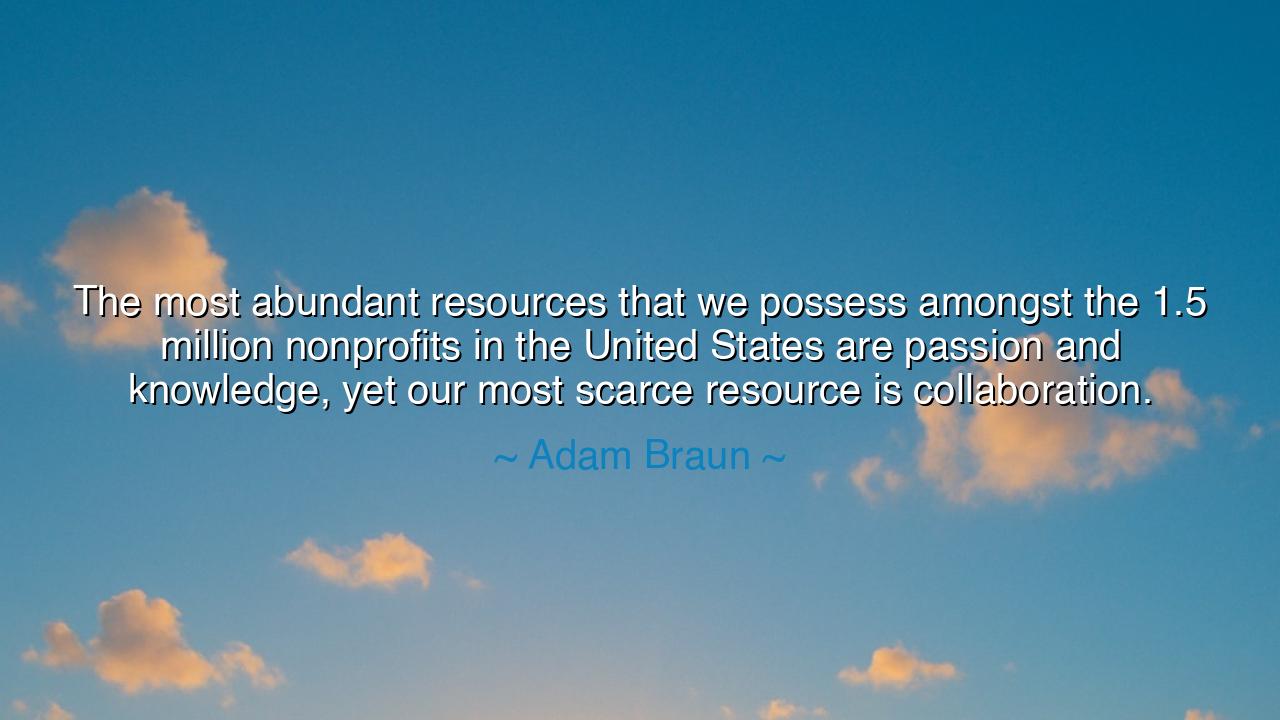
The most abundant resources that we possess amongst the 1.5
The most abundant resources that we possess amongst the 1.5 million nonprofits in the United States are passion and knowledge, yet our most scarce resource is collaboration.






“The most abundant resources that we possess amongst the 1.5 million nonprofits in the United States are passion and knowledge, yet our most scarce resource is collaboration.” Thus spoke Adam Braun, the visionary founder of Pencils of Promise, whose life’s work has been to bring education to children across the world. In these words, Braun lays bare both the greatness and the tragedy of modern idealism. He reminds us that humanity’s noblest endeavors — those built on compassion and service — often stumble not from lack of will or wisdom, but from the absence of unity. For what good are passion and knowledge if they burn in isolation? What strength has a thousand hearts if they do not beat together?
Braun speaks from within the heart of a movement that seeks to heal the world — the nonprofit realm, where men and women labor not for profit, but for purpose. Within this vast constellation of organizations, he sees abundance everywhere: passion in the hearts of those who serve, and knowledge in the hands of those who build, teach, and heal. Yet, for all this wealth of spirit, one thing remains scarce — the willingness and ability to collaborate, to work as one body rather than as scattered limbs. His words strike with the quiet sadness of truth: that even among those who seek the common good, division can still rule.
The ancients, too, knew the peril of such disunity. When the city-states of Greece stood divided — Athens proud, Sparta stubborn, Thebes envious — their brilliance could not save them. Though each possessed genius, valor, and culture beyond measure, their refusal to collaborate led to ruin. United, they might have stood eternal; divided, they fell to foreign conquest. The same lesson echoes across every age: knowledge and passion are mighty forces, but they scatter like sparks in the wind without the bond of cooperation. The strength of civilization has always been measured not by how much its people know or love, but by how deeply they are willing to work together.
In Braun’s world, the realm of social change, this truth carries a sacred weight. Every nonprofit seeks to lift some burden — to fight hunger, educate the poor, protect the earth — and yet how often do they labor apart, competing for attention, funding, or recognition? The cause is shared, yet the effort is divided. Thus, their light, though bright, is fragmented — and the darkness endures longer than it should. Braun’s lament is not of despair, but of longing: that those who share the same mission might learn to join forces, to weave their strengths into a single, unstoppable thread.
Consider the story of Doctors Without Borders, an organization born not from one vision, but from the uniting of many. Physicians, journalists, and activists came together after witnessing human suffering in war-torn lands. They set aside their differences — of profession, of nation, of ideology — and built something far greater than any could have achieved alone. Their success became a testament to Braun’s ideal: that when passion and knowledge are bound by collaboration, they become transformative. Alone, each might heal a few; together, they heal nations.
The deeper wisdom of Braun’s quote is not limited to charities or institutions. It is a truth of the human spirit itself: the greatest things we can build, we can only build together. In families, in communities, in the world at large — passion and intelligence are abundant, but unity is rare. We live in an age where connection is easier than ever, yet true collaboration, the joining of hearts and hands toward a shared goal, is still elusive. It demands humility, patience, and the surrender of ego — the rarest virtues of all.
Therefore, let this be your lesson, O seeker of purpose: do not hoard your passion or your wisdom; share them. Seek out those whose dreams align with yours, even if their paths differ. Where others compete, you must connect; where others divide, you must bridge. The world’s greatest revolutions — in science, in art, in justice — were born not from solitary minds, but from collaborations of visionaries. If you would change the world, learn first to stand not above others, but beside them.
And so, remember the wisdom of Adam Braun: passion and knowledge are gifts, but collaboration is the alchemy that turns them into gold. Alone, we are sparks; together, we are flame. Alone, we dream; together, we build. The destiny of humankind — and of every noble cause — depends not on how brightly we burn apart, but on how bravely we shine as one.






AAdministratorAdministrator
Welcome, honored guests. Please leave a comment, we will respond soon